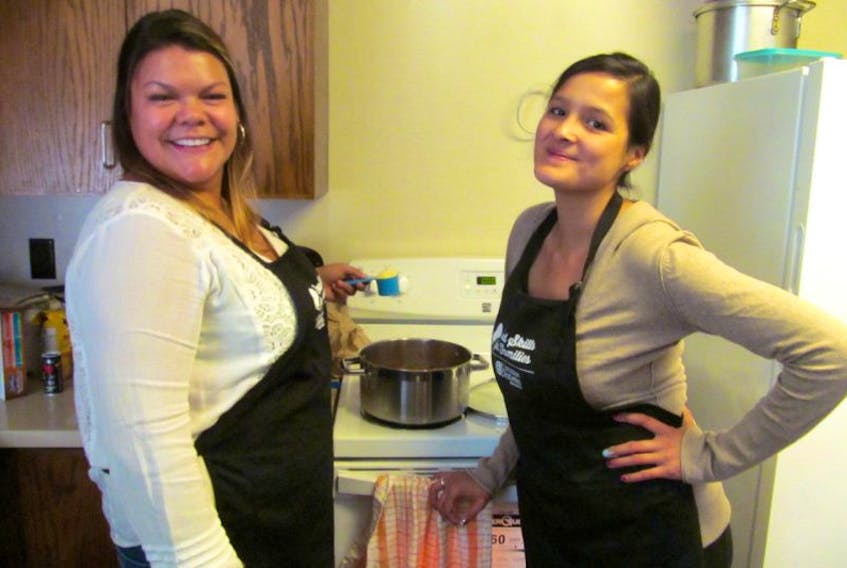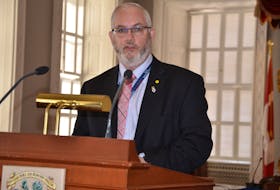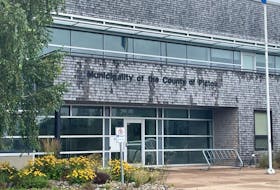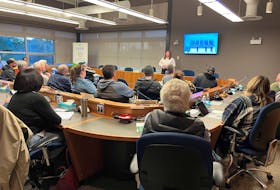And it was all healthy – part of a program put on by the Canadian Diabetes Association to teach Aboriginal Nova Scotians how to shop for and cook healthy meals.
The program is called Food Skills for Families and last week, it was training nine people from all over Nova Scotia how to cook, shop for, and present healthy meals, so they could take the knowledge home to others in their community.
Jill MacDonald is a master trainer with the Canadian Diabetes Association’s program. She was leading the project in Liverpool.
As people made a lunch of homemade minestrone soup, tofu and vegetable stir-fry, fish with a tropical salsa, and baked granola bars, she explained the purpose of the program.
“It teaches people about healthy eating, how to choose food, prepare food, shop for food and eat food,” she says. “Our program has been focused on people who tend to be high-risk.”
The program started in British Columbia, but it was so successful, MacDonald said the association decided to expand it to other parts of Canada. Liverpool was the first location in Nova Scotia to host it.
“It’s a great first start for us to be able to expand the program into the Atlantic,” she says.
MacDonald says the program is focusing on Aboriginal people because that population has a higher risk of developing type 2 diabetes.
“We know we can’t change the genetic predisposition but we feel it could help towards prevention, but it will definitely help towards the management of diabetes for this population.”
She says she’s found that many people no longer know how to cook, basic cooking skills have been taken out of schools, and many people rely on fast food.
“People just haven’t had the opportunity in some cases to learn how to cook, and they’re just not aware of in some cases what is a nutritious meal.”
She says her students are often surprised at how delicious healthy food can be.
“It’s been fantastic that way because people really in some cases haven’t tried the food that we’ve made, when they eat it they really amazed at how delicious they are.”
Tyra Denny was learning that at the Native Council. In Liverpool She says normally she would eat fast food, but she may not do that as often.
“I learned that cooking home-made food is fun, and you learn a lot from your colleagues,” she says.
“I learned how to cook different things that I never tried before. It’s kind of like new food to me. I would normally eat take-out, poutine.”
Denny works in Truro, and part of the program was to give her the skills to take back to her community, so she can teach others how to cook healthy meals.
And it was all healthy – part of a program put on by the Canadian Diabetes Association to teach Aboriginal Nova Scotians how to shop for and cook healthy meals.
The program is called Food Skills for Families and last week, it was training nine people from all over Nova Scotia how to cook, shop for, and present healthy meals, so they could take the knowledge home to others in their community.
Jill MacDonald is a master trainer with the Canadian Diabetes Association’s program. She was leading the project in Liverpool.
As people made a lunch of homemade minestrone soup, tofu and vegetable stir-fry, fish with a tropical salsa, and baked granola bars, she explained the purpose of the program.
“It teaches people about healthy eating, how to choose food, prepare food, shop for food and eat food,” she says. “Our program has been focused on people who tend to be high-risk.”
The program started in British Columbia, but it was so successful, MacDonald said the association decided to expand it to other parts of Canada. Liverpool was the first location in Nova Scotia to host it.
“It’s a great first start for us to be able to expand the program into the Atlantic,” she says.
MacDonald says the program is focusing on Aboriginal people because that population has a higher risk of developing type 2 diabetes.
“We know we can’t change the genetic predisposition but we feel it could help towards prevention, but it will definitely help towards the management of diabetes for this population.”
She says she’s found that many people no longer know how to cook, basic cooking skills have been taken out of schools, and many people rely on fast food.
“People just haven’t had the opportunity in some cases to learn how to cook, and they’re just not aware of in some cases what is a nutritious meal.”
She says her students are often surprised at how delicious healthy food can be.
“It’s been fantastic that way because people really in some cases haven’t tried the food that we’ve made, when they eat it they really amazed at how delicious they are.”
Tyra Denny was learning that at the Native Council. In Liverpool She says normally she would eat fast food, but she may not do that as often.
“I learned that cooking home-made food is fun, and you learn a lot from your colleagues,” she says.
“I learned how to cook different things that I never tried before. It’s kind of like new food to me. I would normally eat take-out, poutine.”
Denny works in Truro, and part of the program was to give her the skills to take back to her community, so she can teach others how to cook healthy meals.









